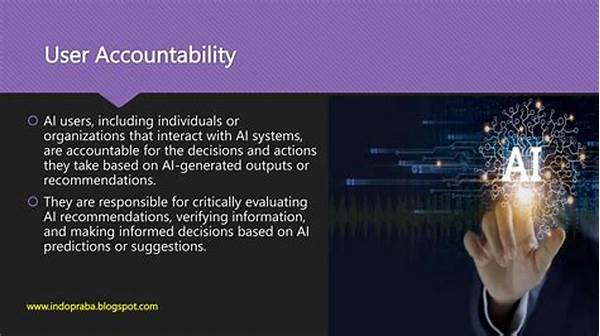In the rapidly evolving landscape of technology, artificial intelligence (AI) stands at the forefront, steering changes across various industries. While AI promises immense benefits from automation to enhanced data analysis, it also poses significant ethical challenges. Accountability in artificial intelligence is a pivotal consideration as we integrate AI into daily life. The primary purpose of this article is to explore the concept of accountability in AI, highlighting its importance and urging stakeholders to address the pertinent issues.
The Importance of Accountability in AI
The rapid advancement of AI has necessitated an urgent discussion on accountability. As AI systems increasingly make autonomous decisions, the question arises: who is responsible when things go wrong? Is it the developers, the organizations deploying these systems, or the technologies themselves? Ensuring accountability in artificial intelligence is crucial not only for ethical and legal reasons but also for fostering public trust. Failure to address accountability can lead to misuse of power, discrimination, and potentially harmful outcomes, ultimately stalling the progression of AI.
Accountability in artificial intelligence involves setting clear standards and frameworks that define who is responsible for AI-driven decisions. It demands transparency in AI algorithms and processes, enabling stakeholders to scrutinize and validate outcomes. As AI systems mimic human decision-making processes, it becomes imperative to establish mechanisms that hold appropriate parties accountable and ensure the technology is used ethically and responsibly.
Furthermore, businesses leveraging AI technologies must prioritize accountability as part of their corporate responsibility. By doing so, they not only safeguard their reputation but also gain a competitive edge in the market. Consumers are more likely to engage with brands that demonstrate integrity and responsibility, recognizing the value of accountability in artificial intelligence.
Balancing Innovation with Responsibility
In conclusion, as AI continues to permeate various aspects of life, accountability becomes integral to its development and implementation. Stakeholders, including developers, businesses, and regulators, must collaborate to create comprehensive guidelines and frameworks. By ensuring accountability in artificial intelligence, we can harness its potential while minimizing risks and promoting a fair, equitable society.
—
The quest for accountability in artificial intelligence is akin to navigating uncharted waters. This exploration delves into the intricacies of AI accountability, examining its implications and the steps needed to foster responsible AI usage.
Accountability Mechanisms in AI
Accountability mechanisms in artificial intelligence are essential to safeguard against potential misuse and ensure ethical practices. Establishing clear guidelines involves multisectoral cooperation, integrating technological advances, and upholding human rights. Transparency plays a vital role in this process, enabling stakeholders to comprehend AI reasoning and outcomes.
The implementation of auditing processes can further enforce accountability in AI. Regular audits and checks on AI systems help in identifying biases and errors at an early stage. Furthermore, legislative measures are essential to regulate AI activities, ensuring compliance with ethical and legal standards.
With these accountability mechanisms in place, we can not only enhance AI’s reliability but also encourage industry-wide adoption of ethical AI practices. This paves the way for a future where artificial intelligence acts as a tool for societal betterment, guided by principles of fairness and accountability.
The Role of Stakeholders
Stakeholders, including AI developers, policymakers, and end-users, play a crucial role in ensuring accountability in artificial intelligence. Developers are tasked with building transparent and explainable AI systems that allow for easy interpretation of decisions. Meanwhile, policymakers need to create a legal framework that clearly outlines responsibilities and liabilities associated with AI deployment.
End-users, on the other hand, should be educated about AI’s capabilities and limitations, enabling them to make informed decisions. By fostering a collaborative environment, stakeholders can work together to mitigate AI-related risks while maximizing benefits. Accountability in AI is not a one-person job; it’s a collective responsibility that demands active participation from all involved parties.
—
10 Examples Related to Accountability in Artificial Intelligence
—
Ensuring accountability in artificial intelligence is crucial in holding appropriate parties responsible for AI-driven decisions. As we continue to rely more on AI technologies, maintaining transparency and accountability is imperative to protect ethical standards, foster innovation, and build trust among consumers. With collaborative efforts from all stakeholders, we can establish an AI landscape that is both safe and sustainable.

